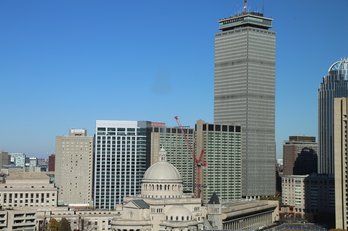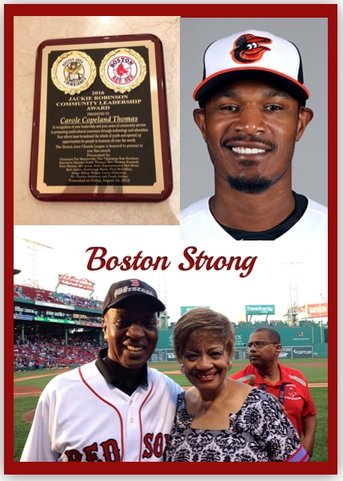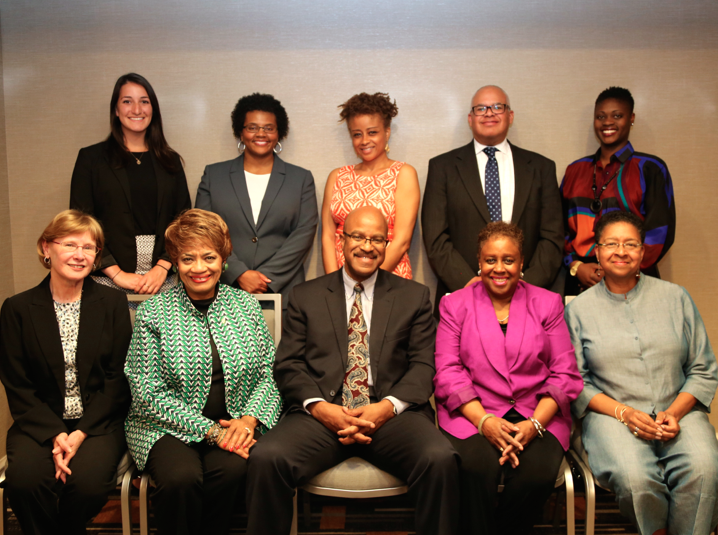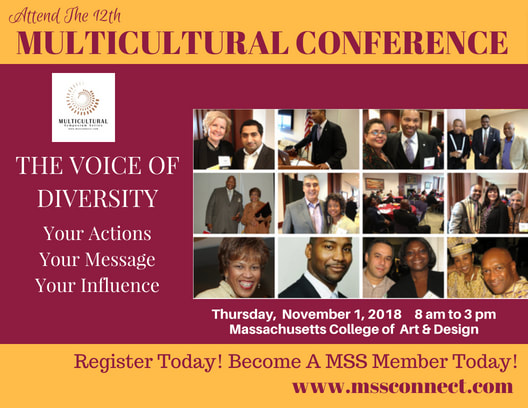|
Top Left: Boston Red Sox Award Top Right: Adam Jones Bottom: Awardees Harvard Law School Professor Charles Ogletree & Carole Copeland Thomas  Full disclosure. As a native Detroiter who has lived in the Boston area for more than 35 years, I cringe when I hear stories about racism in my adopted city. As a diversity speaker and trainer for 30 years, the pain of these stories runs deep. For nearly a week, I have read the newspaper reports about a stupid local fan who yelled out the “n-word" during last week’s Boston Red Sox - Baltimore Orioles game at Fenway Park. The victim, Orioles center fielder Adam Jones, tempered his anger, even after the same fan or another one threw a bag of peanuts at him, missed and hit a police officer. The incident threw Boston back in the news as a city that can’t ditch racism no matter how hard it tries. It's now become a national news story that forces us to remember that The Red Sox were the last team to recruit a black player in the major leagues. Its owner at that time, Tom Yawkey, had no use for black people, including rising baseball stars like Jackie Robinson and Willie Mays. That history was buried when the new owner, John Henry II, took a very pro-active stand to make his team more diverse and inclusive. Other players have also been called the “n-word” at Fenway, which makes it even worse. Those are the facts. Lingering racism remains with the diehards who just can’t accept the realities of a changing city and nation where multiculturalism is a mainstream choice for most. Clearly, city and state elected officials have beaten the drums about making our region more inclusive. Boston’s Mayor Martin J. Walsh and Governor Charlie Baker immediately condemned the ballpark incident as intolerable, socially and morally unacceptable. The Red Sox team president, Sam Kennedy, stated, “I find it despicable. There’s no place for it.” And so go similar comments uttered in board rooms and community centers. Boston is NOT a city of hate. Boston rejects racism of any kind. The fans made that point very clearly during the ballgame between the rival teams the next day. They gave Adam Jones a prolonged standing ovation to show their support for him despite the previous night’s ruckus. There’s another side to consider when you look at what happened at Fenway Park. Boston HAS changed. I should know as a 35 year resident of the region. Many factors have led to the transformation of Boston. Both governmental and private initiatives have worked diligently to mute the angry and hateful voices of the past. Take, for example, the efforts of the Greater Boston Convention and Visitors Bureau (GBCVB). They created a Multicultural Committee, designed to transform the image of Boston (www.crossculturalboston.com). The first committee was launched in the early 1990s as the city geared up for some high-profile national minority conventions scheduled to come to the city. One of them held in 1995 was the national conference of the National Black MBA Association. I served on the Multicultural Committee and as the local chair of that event that hosted over 5000 black professionals from around the United States and beyond. The efforts of the Multicultural Committee combined with support from corporate leaders and then-Mayor Thomas Menino led to one of the most successful conventions in the association’s history. The Multicultural Committee took a hiatus for a few years in the late 1990s and relaunched in 2003 under GBCVB President & CEO Pat Moscaritolo. He appointed me as the committee chair, and we have been rocking and rolling ever since. Our committee of nearly 15 ethnically diverse business owners, hospitality leaders, and GBCVB staff meet every month except for July and August. We commit to serving in this volunteer role because we care about the image and reputation of our city. The committee formulates ways that we can support the Bureau’s efforts to attract conventions of color. We attend various functions and serve as a welcoming body when executive boards and association leaders come to town. Our enthusiasm mounted in 2014 when both the National Association of Black Journalists and The Eastern Regional Conference of Delta Sigma Theta, Inc. hosted their meetings just weeks apart. Both groups left Boston with renewed levels of confidence that the city was embracing diversity and inclusion in powerful new ways. Other conferences, including The National Council of La Raza, The Asian American Journalists Association, Blacks in Government and The Urban League have all had national meetings in Boston, with much success. One of my finest moments was a sunny afternoon in August 2016 when the Boston Red Sox and the Boston Church League honored me and several other civic, social justice and business leaders on the playing field at Fenway Park. We stood on that bright green turf, heard our names announced over the PA system and received the cheers from thousands of fans across the ballpark. No-one shouted the “n-word.” No-one threw bags of peanuts at us. No-one audibly disrespected us. Our families and friends cheered with the crowd in support of our achievements. It was a shining moment for all of Boston and us. As a diversity trainer and speaker, I choose to look at the glass half filled. The days of forced busing in South Boston are long gone. The confrontations and racial divisiveness of the past have been replaced by a city that is now a progressive international destination that welcomes the world. We condemn the actions of ignorant fans who can’t let go of their racism. They have been ejected from Fenway Park and shouldn’t be accepted anywhere else. They do exist, and I grudgingly acknowledge their existence. But they do NOT represent the life blood of a city that’s turning the corner and closing the chapter of its racial past, never worth reliving. Bostonians are resilient as evident during the 2013 Marathon bombing. And Bostonians rose up last week, delivered a standing ovation, and told Adam Jones and the rest of the world that it’s a city too big to hate and too proud to let the actions of a few stand in the way of progress. =================== As an award-winning speaker, trainer and global thought leader, since 1987, Carole Copeland Thomas moderates the discussions of critical issues affecting the marketplace. She has her pulse on the issues affecting working professionals and regularly consults with industry leaders. She has spent 30 years cultivating relationships and partnerships with local, national and international sponsors, including Walmart, Amtrak and Emirates Airlines. Carole has worked with clients throughout the United States and seven foreign countries. Carole is the past president of The National Speakers Association -New England Chapter and is on the board of the Greater Boston Convention & Visitors Bureau. Carole is a blogger and social media enthusiast using various technology platforms to enhance her business development activities. Carole has been featured in the New York Times, Boston Globe, Black Enterprise, ABC Radio and CBS News. She is the author of four books and is the Past National Vice Chair of the National Black MBA Association www.carolecopelandthomas.com www.crossculturalboston.com Greater Boston Convention & Visitors Bureau Multicultural CommitteeMembers of the GBCVB Multicultural Committee. Standing Left to Right: Turner Skenderian, Dr. ErinnTucker, Tiffany Probasco, Darrell LeMar, Ola Akinawuni Seated Left to Right: Suzanne Grogan, Carole Copeland Thomas, Michael Munn, Donna DuPee, Kelley Chunn
0 Comments
Leave a Reply. |
* * * * * * * *Archives
July 2024
|
©2024 All Rights Reserved Carole Copeland Thomas • (508) 947-5755 • [email protected]



 RSS Feed
RSS Feed